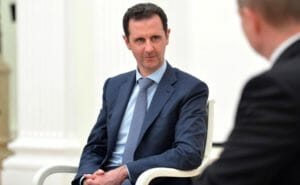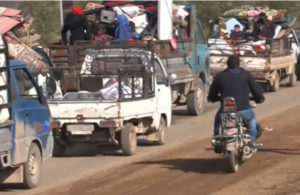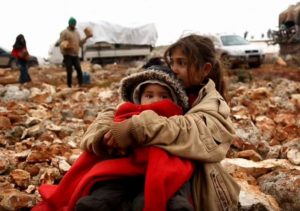Syrian Forces’ Bombing Intensifies in Southern Rebel Holdout
The aerial bombardment of the town of Nawa comes after talks with opposition forces to cede the town fail.BEIRUT — Syrian government forces determined to retake the largest opposition holdout in the country’s southwest unleashed an intense bombing campaign, killing at least a dozen people and wounding over 100 in a densely populated town, activists and rescuers said Wednesday.
The aerial bombardment of the town of Nawa came after talks to cede the town failed on Tuesday, triggering the heavy bombardment.
Separately, some 7,000 civilians were expected to be evacuated from two pro-government villages in northwestern Syria as part of a negotiated deal with insurgents who have besieged them for three years.
The Britain-based Syrian Observatory for Human Rights said “frenzied” overnight bombing in Nawa and the town’s surroundings continued into Wednesday, with at least 350 missiles launched. The Observatory said at least 12 people were killed as rescuers struggled to get to the casualties.
Khaled Solh, head of the local Syria Civil Defense known as White Helmets, said they have documented 14 people killed while Nawa’s only hospital was bombed and rendered non-operational late Tuesday. Only one ambulance was able to get to the town and civilians relied on their cars to bring out at least 150 wounded. He said one of the last orthopedists in the town was killed in the strikes.
The government has stepped up its military offensive on the remaining opposition pockets in the southwestern region, which includes the Daraa and Quneitra provinces that straddle the border with Jordan and the frontier with the Israeli-occupied Golan Heights. In recent days, Syrian forces have turned to the last opposition pockets near the frontier with Israel.
Images from across the frontier in the Israel-occupied Golan Heights showed large plumes of smoke rising over the Nawa area, as the bombing continued Wednesday.
Hundreds of civilians were seen taking cover in shelters along the frontier, apparently seeking safety in the de-militarized zone between the two countries. Israel has occupied the Golan Heights since 1967, and a cease-fire deal was reached in 1974.
In less than a month, Syrian government forces backed by Russian air power have been able to seize control of most of southwestern Daraa province, including the provincial capital of the same name. The city of Daraa was the cradle of the uprising against President Bashar Assad more than seven years ago.
Alongside the military offensive, the government has struck “reconciliation” deals, essentially a negotiated capitulation in a number of villages that have been in rebel hands for years, to restore government control there.
Talks to hand over Nawa, one of the most densely populated towns in Daraa province, have been ongoing for a couple of days. That has encouraged displaced civilians to return to Nawa, said a local activist who goes by the name Selma Mohammed.
But the talks faltered, triggering the overnight onslaught and a new wave of displacement, with hundreds leaving the town again.
On Wednesday, the bombing focused on towns and villages surrounding Nawa, making the road in and out of town deadly, Mohammed said.
The Observatory said warplanes and ground forces have also targeted the southern tip of the region, which is held by militants affiliated with the Islamic State group.
The government offensive has displaced more than 230,000 people, many of them on the run in the open. Jordan said it will not take in new refugees and Israeli soldiers have shooed away dozens of protesters who had approached the frontier Tuesday, demanding protection.
Meanwhile, about 7,000 Syrians were expected to be evacuated from two pro-government villages in northwestern Syria, ending a three-year siege by insurgents who control the surrounding area. Dozens of buses arrived in the Foua and Kfraya villages to transport the evacuees on Wednesday, Syrian state media said.
Evacuation deals have been criticized by the United Nations as forced displacement.
A negotiated deal to evacuate Foua and Kfraya villagers earlier this year faltered after the evacuation of only 40 people from a third village. The evacuees’ first stop is the government-controlled city of Aleppo.
___
Associated Press writer Shlomo Mor in Tal Fares in the Israeli-occupied Golan Heights contributed to this report.
Your support is crucial...As we navigate an uncertain 2025, with a new administration questioning press freedoms, the risks are clear: our ability to report freely is under threat.
Your tax-deductible donation enables us to dig deeper, delivering fearless investigative reporting and analysis that exposes the reality beneath the headlines — without compromise.
Now is the time to take action. Stand with our courageous journalists. Donate today to protect a free press, uphold democracy and uncover the stories that need to be told.



You need to be a supporter to comment.
There are currently no responses to this article.
Be the first to respond.